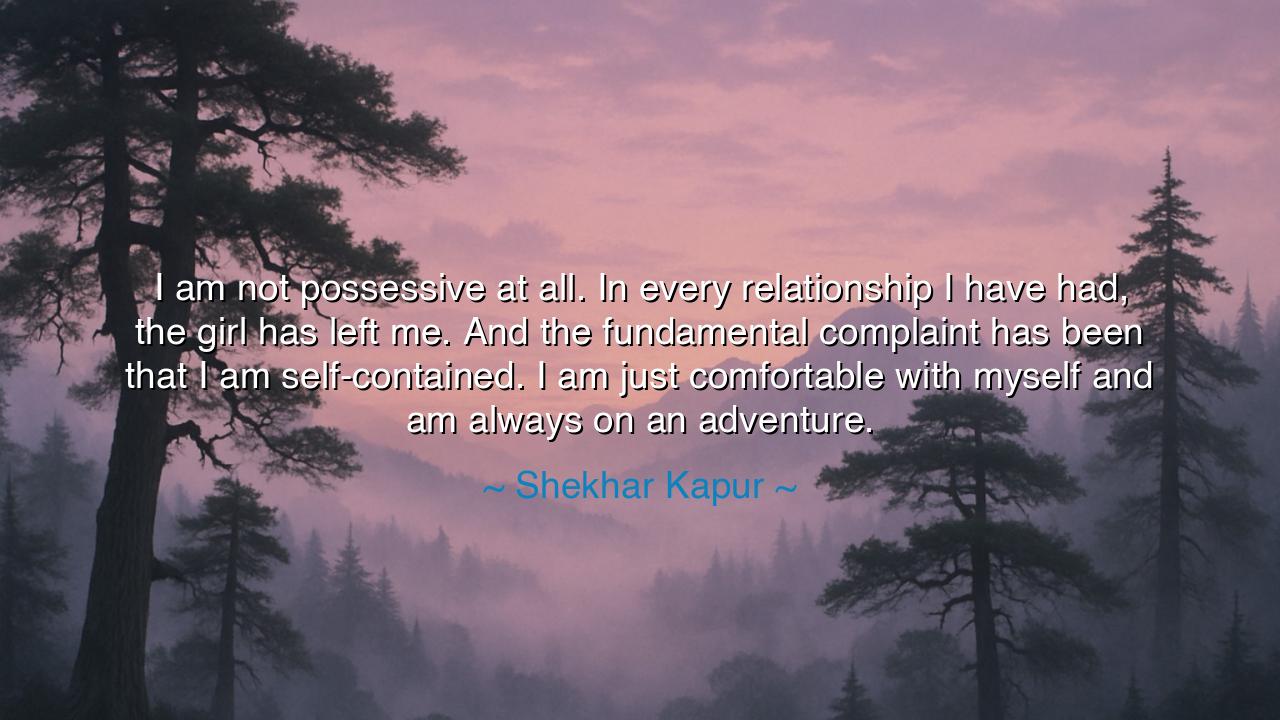
I am not possessive at all. In every relationship I have had
I am not possessive at all. In every relationship I have had, the girl has left me. And the fundamental complaint has been that I am self-contained. I am just comfortable with myself and am always on an adventure.






In the words of the wise Shekhar Kapur, there lies a teaching for all who seek to understand the nature of love, freedom, and the self. He proclaims, “I am not possessive at all. In every relationship I have had, the girl has left me. And the fundamental complaint has been that I am self-contained. I am just comfortable with myself and am always on an adventure.” These words speak of a spirit untamed, one who walks the path of inner wholeness, unbound by chains of control or desire for dominion over another’s soul. Such a man journeys through life as a lone traveler beneath the stars, content with the companionship of his own heart.
The essence of this teaching rests upon the idea of self-containment. Many seek completeness in others, like rivers flowing into the sea. Yet, there are those who are already whole, like a mountain standing firm and unshaken. To be comfortable with oneself is a rare blessing, for it means to carry within one’s own company a wellspring of peace and vitality. However, this very strength may be misunderstood by others, for those who yearn for constant attention and closeness may mistake freedom for indifference.
The lament of those who have departed from him reveals a truth about human longing: people often crave a possessive love, mistaking it for security. When they encounter a soul who does not cling, they feel abandoned, even when they are cherished. Thus, the adventurer, who seeks discovery and growth, may appear distant to the one who seeks permanence and control. This is the eternal tension between the spirit of exploration and the desire for stability.
His words are not of sorrow, but of understanding. For to be “always on an adventure” is to honor life as a great unfolding journey. The world itself becomes a companion, and every experience a teacher. Though others may leave, the self-contained wanderer remains steadfast, for his deepest relationship is with the vastness of existence itself. In this way, love, freedom, and adventure are woven together, forming a tapestry of wisdom for future generations to behold.
Thus, let these words remind us: true harmony arises not from possessing another, but from walking side by side as equals, free and whole, yet willing to share the road while it lasts.






XNPhan Xuan Nhat
I wonder if Shekhar Kapur’s approach to relationships could be a form of self-protection. Maybe his independence and focus on personal adventures are his way of avoiding vulnerability or disappointment. Could this be a pattern that many people follow when they’ve been hurt in the past, preferring to stay self-contained rather than risk being emotionally dependent on someone else? How can we break free from this mindset if we want to form deeper, more connected relationships?
LTTuyen Luong thi
Shekhar Kapur’s quote brings up the question of emotional availability in relationships. While his self-containment may be a sign of strength and self-sufficiency, it sounds like it may also be a barrier to deeper emotional connections. Is it possible to maintain your own sense of self while also being fully present for your partner? How do we strike a balance between pursuing personal adventures and fostering closeness in romantic relationships?
1L13-Cam Ly-12A11
Kapur’s reflection makes me think about the importance of balance in relationships. On one hand, being self-contained and independent can be a sign of emotional maturity, but on the other hand, it seems to have led to dissatisfaction for him in his romantic life. Does this suggest that even the most independent people need vulnerability and emotional connection to make relationships work? Could there be a way to balance adventure and closeness without compromising either?
NNNgoc Nguyen
It’s interesting that Shekhar Kapur attributes his relationships ending to his self-contained nature. Does being comfortable with oneself necessarily mean a lack of desire to connect emotionally with others? Or is it simply that he prefers freedom and exploration over attachment? Could this mindset make it difficult to meet someone who shares the same level of independence, or is it more about finding balance in relationships?
DNDieu Nguyen
I find Shekhar Kapur’s take on relationships both liberating and somewhat sad. He seems to embrace his independence, but at the same time, it’s clear that his partners weren’t always on the same page. Is it possible to be self-contained and still build lasting connections with others, or is the need for emotional closeness and vulnerability something that can’t be overlooked in relationships? Where do we draw the line between independence and emotional availability?